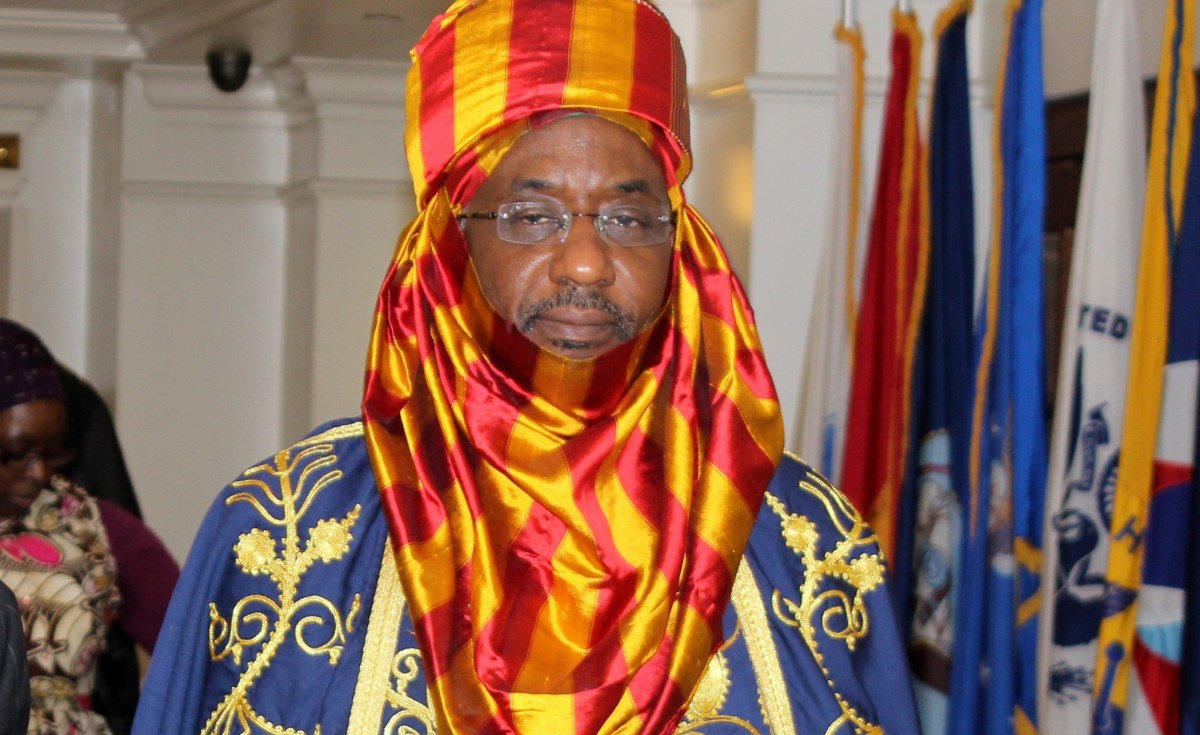Muhammad Sanusi II, the 14th fulani Emir of kano and former Governor of the Central Bank of Nigeria, CBN, has said that he was not interested in contesting the presidency, come 2023.
He spoke, at a special 60ther Birthday dinner, organized by the Nigerian Platform, NP, in Abuja, on Sunday, August 15, 2021.
“I never hid the fact that my ambition was to be the Emir of Kano. In fact, I have never hidden my intentions about anything. So if I say I am not interested in politics, it is because I am not interested in politics.
“If I want to go into politics, I will come out and say I am contesting for the President of Nigeria. I am a Nigerian. But I am not interested. This is because I haven’t prepared myself for politics.
“I had prepared myself for a long time for an academic life, I prepared myself for the Emir, I prepared myself for banking and finance but I have no one day experience in politics. You can’t just jump into politics, you learn,” Mal Sanusi said, amidst remarks by guests, suggesting that he would be supported if he showed interest in becoming Nigeria’s president.
The former CBN boss expressed gratitude to God, as according to him, he has been fortunate enough to realise his life ambitions.
He said “I have been fortunate. I have the highs and lows of life but I have been on a permanent high.
“I have so much to thank God for at 60 years. I wouldn’t say I have achieved, but favours have been bestowed upon me.
“If you are a Chief Risk officer of a bank like UBA and First Bank and successfully ended your career there, you will consider yourself a fully accomplished banker and you will be happy.
“Now to be that and to have been the only northern Nigerian CEO at First Bank in 125 years, then to have been the Governor of CBN, then to have been the Emir of Kano, then to have been the Khalifa Tijjaniya in Nigeria. The title started in 1965 and I’m only the third holder of that title. The first was my grandfather, Isiaka Rabiu, and then myself. I have nothing but gratitude to offer.”
The former Emir identified fear and greed as the two vices that destroyed the nation.
According to him, “The idea of the Nigerian Platform was formed because of the desire to be part of Nigeria’s solution.
“Two things destroy the country – fear and greed, if you can conquer those, we will make this country a great country.”
Sanusi II noted that responsibilities come with privileges, adding those who have been bestowed with privileges should always take care of the ordinary, poor people.
He said, “The God who created us, created everybody. The God that created the CBN governor, the President also created the peasant farmer. There is nothing to show that God loves you more. But God gives you the privileges to be able to touch the lives of those not given.
“If you cannot think beyond how many properties you have, how many cars you have, how many children you have etc, you are not really far from the animal kingdom. Because a human reasoning must understand that there must be reasons for your privileges.
“We must remember the millions out there starving, the malnourished, sick, out of school etc and if we don’t spend every minute of our lives thinking how we can give them a little bit of what we have been blessed with we have a problem.
“These are the kinds of passion that should drive us without which we are doomed. We should be living for other people. At 60, I don’t expect to live another 60 years. The sense of the transience of life and the privileges should make us touch the lives of others.”
On what he has been doing since leaving the seat as Emir of Kano, he said,
“I started my life as an academic in ABU (Ahmadu Bello University, Zaria) and I abandoned it and went into banking. I went into banking and I became an Emir. I want to complete that one lose end in my life. So I have applied and I have been admitted and by September I am writing a PHD in Law at the University of London. I’m writing my thesis on the codification of Muslim Family Law as instrument of social reform.”
The former CBN boss expressed disappointment that the law he initiated with a view to reforming the social lives of Northern Muslims with regard to the rights of women and “Almajiris” and child marriage, among others, has not been passed by the Houses of Assembly of Kano and other Northern states with majority Muslim populations.
“We have done a law, it has not been implemented in Nigeria but that is fine. It has not stopped me from doing research on it, writing books on it, publishing on it because if this generation does not listen, maybe the next will.
“Maybe the time has not come for Northern Nigerian Muslims to accept that it is wrong to beat your wife, maybe the time has not come for them to understand that they should not marry-off their daughters at twelve or thirteen, maybe the time has not come for them to understand that even if you cannot maintain one wife, you should marry four and you can have fifteen children and leave them on the streets.
“Maybe the time has not come but it doesn’t mean it is the right thing. Maybe 10 or 20 years from now, we will be back there. The truth will always be the truth. You can ignore it but if it has consequences, you can never escape those consequences.”







